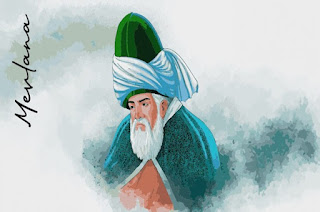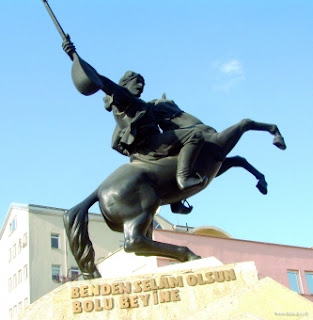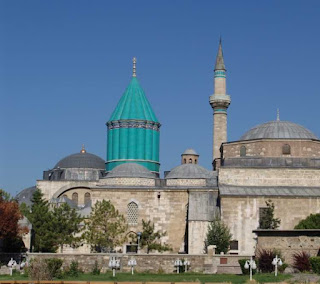LEGENDARY PEOPLE OF KONYA
Hi we are Kayra and İsmail. We are going to give you
some information about legendary figures from Konya.
MEVLANA
As a Sufi lived
in the 13th century, but got beyond the ages with his works, Mevlana did not
make any discrimination between people as indicated in his verse “Come, come
whoever you are”. In addition to his mercy, voluntary and unlimited love of
humanity, he had endless tolerance, which impressed not only the world of Islam
but also the whole humanity. He is accepted worldwide as an intellectual with
his point of view to the people and life. Due to the 800th
anniversary of Mevlana’s birth, UNESCO declared the year 2007 as Mevlana and
Tolerance year.
Throughout his education, Mevlana visited the
educational institutions of various cities of different countries of his time
not only as a student but also a scholar. Mevlana attributed great importance
to “change” in his philosophy throughout his life.
Theologian poet (b. 1226, Larende / Karaman - d. 11
November 1312, Konya). He is the son of Mevlânâ Celâleddîn Rûmî.
His actual name was Bahaeddin Muhammed. He was raised
with lessons he took from his father.
On the death of Çelebi Hüsameddin, his father’s
successor in 1284, he accepted the position and became the Sheikh.
However, he made it clear that the real successor
should have been Kerimüddin Bektemür and until his death, he had great respect
for him.
Sultan Veled, who in his youth served his father and
later on Çelebi Hüsameddin, put the principles and ceremonies of the sect of
the Mevlevi dervishes in order when he became the Sheikh.
He made concerted efforts until he died, in order for
sect of the Mevlevi to expand. He is buried next to his father in the Mevlânâ
tomb.
His works are the most dependable primary sources for
research related to Mevlânâ and the sect of the Mevlevi dervishes.
Sultan Veled’s poems are not important because of
their artistic features, but due to theİR being the first examples of old
Anatolian Turkish. All his works originate from the guidance of theosophy.
CELALEDDİN KARATAY
Celaleddin Karatay was a notable statesman of the
Anatolian Seljuks. While there are many historians claiming that he had Turkish
Origins, he entered politics after his education in the Gulamhane of the
Anatolian Seljuks. Gulamhane is a school primarily for the slaves thought and
trained to be guards or officials to the palace. Gulam stands for a little boy
in the Arabic language. He was most probably enslaved in between the Cilicia or
Cappadocia regions of Anatolia during the Armenian Campaign of I Kaykhusraw.
After his education, he became a scribe of the council, head of the
housekeeping of the Sultan, and the accountant of the Sultans personal wealth.
He remained as the assignee of the Seljukian Sultan in his absence from the palace
and remained the accountant of the Sultan until he passed away in Kayseri city.
Along with Karatay Madrasa, he financed many structures in the Anatolian
Seljukian lands. There is a district called Karatay in Konya.
ALİ ULVİ KURUCU
After completing his primary and secondary education
in Konya, Ali Ulvi Founder went to Egypt, Cami'ul-Azhar, for higher education,
from there he moved to Medina-i Münevvere, spent most of his life there and
again went to Medina-i Münevvere. He is an important intellectual and poet who
passed away in . Ali Ulvi Founder, who wrote poems
on various subjects, brought together his poems, which he had previously
published in magazines and newspapers, in the book titled Gümüş Tül in 1962.
The book was later published under the name Silver Tulle and Flames. Mehmet
Akif had a significant impact on the formation of the poet's literary
personality and world of ideas. This situation was also reflected in the
Founder's poems, and Mehmet Akif was the subject of some of his poems. Four (4)
poems of the Founder are poems that can be evaluated within this framework.
This article is about how Mehmet Akif Ersoy is expressed in Ali Ulvi Founder's
poems. Document review method was used in the research. The first four poems in
the section titled Akif - İkbâl in Founder's work titled Silver Tulle and
Flames were accepted as the documents of the research. At the end of the
research, the Founder stated that Mehmet Akif undertook a lofty duty and guided
humanity with his work called Safahat, that Akif was made immortal by telling
the Turkish people and history, that Mehmet Akif gave moral hope to the Turkish
nation with the National Anthem and that he played an important role in the
Turkish National Struggle. It has been determined that he played a role in the
war of independence, that he was one of the spiritual architects of the War of
Independence, and that in these aspects it reminds him of the Pakistani Poet
Muhammad Iqbal.





Comments
Post a Comment